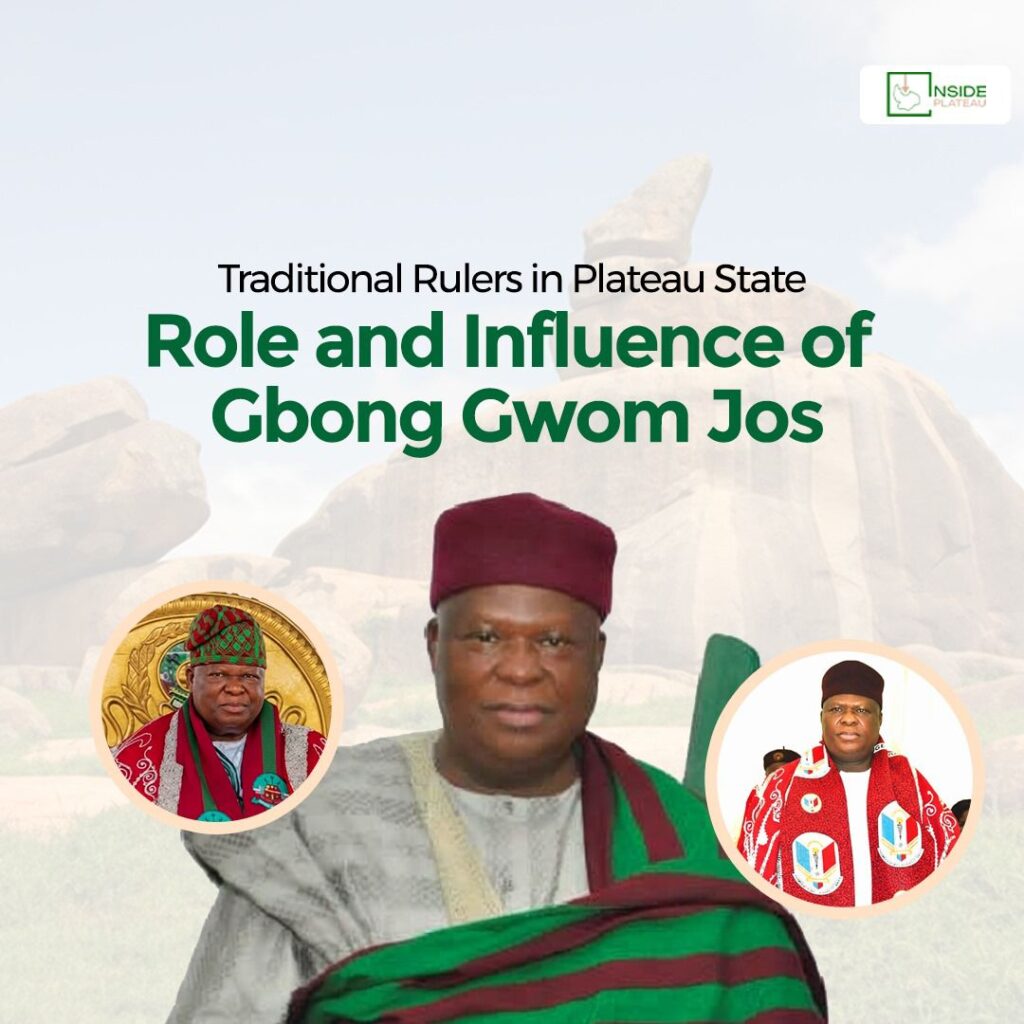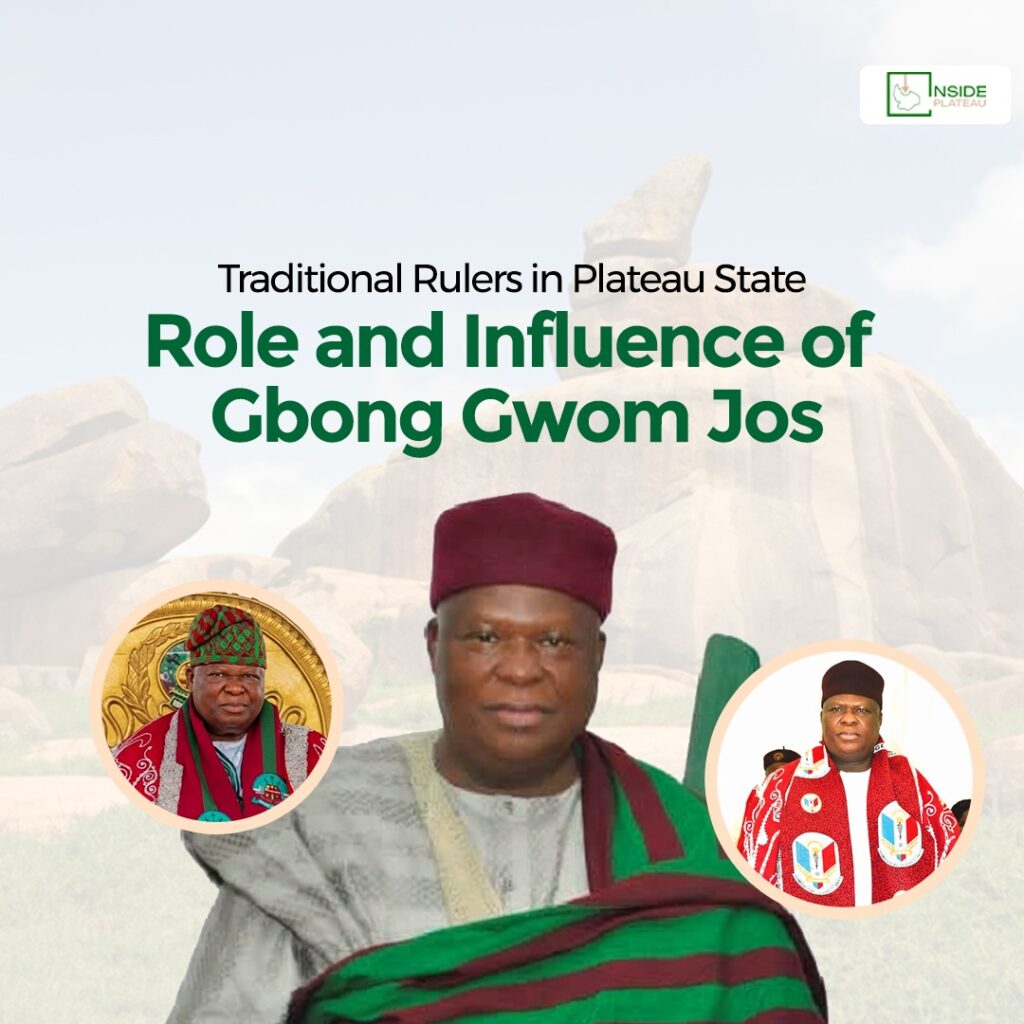
In Plateau State, the traditional institutions have remained very strong pillars of governance and identity. There are many traditional rulers in Plateau State, but none stands taller than the Gbong Gwom Jos. Gbong Gwom is not only the paramount ruler of the Berom Nation, but he is also the Chairman of the Plateau State Council of Chiefs and Emirs. Beyond wearing ceremonial robes and the palace rituals, the Gbong Gwom Jos plays a very vital role in cultural preservation, peace building, and he’s an advocate for development across Plateau State.
The Stool and Its Origins
The office of the Gbong Gwom Jos was created during the colonial era when the British introduced a single recognized authority to interact with the Berom people. However, what initially began as an administrative structure of the colonial masters has now transformed into one of the most respected cultural institutions in Nigeria. Today, the stool represents unity, history, and it’s now a bridge between the tradition and political governance in Plateau State.
In August 2009, the stool was occupied by Da Jacob Gyang Buba, who was the former Comptroller-General of the Nigeria Customs Service. His rich administrative experience and cultural legitimacy has positioned the Gbong Gwom as a voice of tradition and also a very influential figure in Plateau State’s affairs.
Custodian of Culture and Traditions in the State.
The Gbong Gwom is the custodian of Berom culture, therefore he safeguards the values, the festivals, and the rich culture and traditions that have defined the Plateau State for centuries. Traditional Festivals like the Nzem Berom showcase the Berom dances, Berom music, and the ancestral rituals that remind the Berom people of their roots.
In his words during the last Nzem Berom, the Gbong Gwom said this about the Berom Women:
“Our women have shown uncommon strength and wisdom in holding families and communities together. They have been a voice for peace and a light during dark moments. Your leadership in culture, home-building, and peacekeeping must be sustained. Do not be ashamed of your heritage; wear it with pride.”
The above message clearly underlines the way the Gbong Gwom views culture; not as a memory of the past, but as a tool of unity and resilience for the people of Plateau State.
Gbong Gwom , a Voice for Peace and Justice
During the episodes of violence and communal conflicts experienced over the years, the voice of the Gbong Gwom Jos always calls for calm and reconciliation. The Gbong Gwom’s palace serves as a meeting point where issues and disputes are resolved, grievances are heard, and peaceful coexistence encouraged.
Though the Gbong Gwom holds no legislative power, his authority carries real weight. Communities, religious and political leaders, and top celebrities listen when he speaks. These unique roles make him a key figure in sustaining peace across Plateau State.
Gbong Gwom Jos as an Advocate for Development in Plateau State.
Gbong Gwom Jos is not only confined to tradition; he is also a very strong advocate for economic justice and development. He has often raised concerns and asked questions over the exploitation of Plateau State’s rich mineral resources; especially in the mining communities where the locals remain poor despite the vast wealth that is beneath their soil.
The Gbong Gwom lamented in 2025 and I quote:
“Make sure that the localities also enjoy the good of the land.”
Da Jacob Gyang Buba further went on to condemn how selfish interests have taken over the mining sector in Plateau State at the detriment of host communities, relegating them to abject poverty. This call strongly resonates in a state where mining has over the years shaped the economy but left scars of environmental damage.
Gbong Gwom’s Influence in Governance
As the head of the Plateau State Council of Chiefs and Emirs, Gbong Gwom Jos provides advice to the Plateau State government on several policies ranging from the use of land, to security. The Royal Father’s role is not just symbolic but also consultative because it helps shape the decisions that affect the grassroots communities.
Gbong Gwom has also used his platform to condemn political selfishness and greed, he encourages unity and accountability. In his words: “None of us, not even the stool of the Gbong Gwom, is above the people, because there can never be a king without people.” This act of humility reinforces his position as a people-centered leader.
Challenges and Resilience
Despite his strong influence, the Gbong Gwom also faces challenges which includes: The rise of partisan politics, rapid increase of new traditional stools, and the attempts to redefine traditional boundaries have occasionally undermined his authority. Also, insecurity across Plateau State weighs heavily, as the communities often look to him for solutions that mostly require government intervention.
Even at such, the resilience of this stool lies in its adaptability. The Royal Father continues to blend cultural leadership with modern advocacy, shaping conversations on security, governance, and development in Plateau State.
A Timeline of all Past Gbong Gwoms
1. 1920 – Gbong Gwom Rwang Pam
He is recognized as the first officially installed Gbong Gwom under the colonial authority.
2. 1941 – Gbong Gwom Da Rwang Pam (reigned until 1969)
He is remembered for strengthening the Berom cultural festivals and the traditional institutions.
3. 1969 – Gbong Gwom Da Fom Bot (reigned until 2009)
Da Fom Bot held the stool for 40 years, he guided the Berom through a period of political change and challenges in Plateau State.
4. 2009 – Present: Gbong Gwom Da Jacob Gyang Buba
The current Gbong Gwom is technocratic but also experienced with cultural leadership, peace building, sustainable development, and justice across the Plateau State.
In conclusion, the Gbong Gwom Jos remains one of Plateau State’s strongest icons of unity, identity, and authority. He understands both the past and present, he always reminds the citizens of their heritage while also promoting peace, justice, and fairness in governance.

